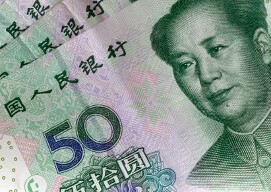
The Chinese yuan is gaining against its US counterpart on Thursday on slowing inflation and recent measures by the federal government to stimulate the economy. But as Beijing employs more initiatives to spur growth, some analysts are sounding the alarm about the worldâs second-largest economy pushing new âuntestedâ policies that may or may not achieve growth officials want.
According to the National Bureau of Statistics, producer inflation climbed less than expected last month to reach the lowest growth rate in two years. In December, the producer price index (PPI) rose 0.9% from the same time a year ago, which is lower than the market forecast of 1.6%.
This comes as the consumer price index (CPI) jumped 1.9% on the year in December, which is also lower than economistsâ projections of 2.1%.
Overall, Chinaâs PPI in 2018 increased 3.5%, while full-year CPI advanced 2.1% — the governmentâs consumer inflation target was 3%.
Meanwhile, to combat slumping retail sales growth, local outlets are reporting that China will issue a new series of incentives in the coming year to get consumers to purchase more consumer goods, such as automobiles and home appliances. It remains unclear what these incentives would be and when an official announcement will be made. In November, Chinese retail sales growth tumbled to their lowest levels in 15 years.
But some analysts feel that the sluggish economy is prompting the government to introduce a diverse array of untested policies. One of the latest policy maneuvers is extending more tax breaks to small businesses, saving these companies approximately $30 billion a year.
Christian Fang, an assistant vice president-analyst at Moody’s, told CNBC:
We see growth in China slowing to 6%. I think the bigger issue for us is that policy trade-offs have increased in China. On the one hand, there is this broader campaign of de-risking, deleveraging, but policy also seems to be shifting slightly towards growth â supporting growth.
Some of the tools in the policy response they have meted out are untested. Tax cuts, for instance, we don’t know what the businesses and the consumers â how they would respond to the tax cuts.
Last week, the Peopleâs Bank of China (PBOC) confirmed that it was slashing the amount of reserves financial institutions are required to have by 1%. The purpose is to encourage banks to lend out more to small firms.
The news comes as US officials say that trade negotiations with their Chinese counterparts are coming along nicely.
The USD/CNY currency pair tumbled 0.43% to 6.7885, from an opening of 6.8180, at 16:01 GMT on Thursday. The EUR/CNY plunged 0.77% to 7.8173, from an opening of 7.8779.
If you have any questions, comments or opinions regarding the Chinese Yuan,
feel free to post them using the commentary form below.